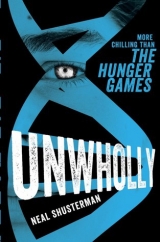
Текст книги "UnWholly"
Автор книги: Neal Shusterman
сообщить о нарушении
Текущая страница: 6 (всего у книги 27 страниц)
6 • Risa
There is only one permanently disabled resident of the Graveyard. Since the disabled are a protected class, they’re never at risk for being unwound, so they never turn up at the Graveyard with all the other kids who ran from their unwind order. It’s a testimony to the swiss-cheese nature of public compassion. Lucky for those to whom grace is extended, but unlucky for those who wind up in the holes.
Risa is disabled by choice. That is to say, she refused surgery that would repair her severed spine, because it involved giving her the spine of an unwound kid. It used to be that spinal damage was irreversible, and if that was the card you were dealt, you spent the rest of your days with it. She wonders if it’s harder to live like that, or to live knowing you can be fixed but choose not to.
Now she lives in an old McDonnel Douglas MD-11, for which they built a wooden switchback ramp to the main hatch. The plane has been aptly named Accessible Mac, or AcMac for short. There are about ten kids with sprained ankles or other temporary conditions who currently share AcMac with Risa, each in sections divided by curtains, providing the illusion of personal space. Risa has the old first-class cabin of the jet, which is forward of the hatch. It gives her a larger living area, but she can’t stand the fact that it singles her out. The whole lousy jet singles her out—and although her shattered spine is a well-earned war wound, it doesn’t change the fact that she is constantly condemned to receive special treatment.
The only other plane with a ramp is the infirmary jet, where she works. It leaves Risa with a very limited choice of interior spaces, so she spends her free time outside when she can stand the heat.
Every day at five o’clock, Risa waits for Connor beneath a stealth bomber they’ve nicknamed Hush Puppy. Every day, Connor is late.
The bomber’s expansive black wings create a huge wedge of shade, and its radar-resistant skin wicks heat right out of the air. It’s one of the coolest spots in the Graveyard, in more ways than one.
She finally sees him approaching: a figure in blue camo that sets him apart from anyone else in the Graveyard. “I thought you weren’t coming,” Risa says as he reaches the shade of Hush Puppy.
“I was supervising an engine dismantling.”
“Yeah,” says Risa with a grin. “That’s what they all say.”
Connor brings his tension with him to these daily encounters with her. He says being with her is the only time he gets to feel normal, but he never truly relaxes. In fact, since she first met him, she’s never known him to relax. It doesn’t help to know that their legends are out there, living lives of their own. Stories of Connor and Risa have already grown deep roots in modern folklore, for few things are more compelling than an outlaw romance. They are Bonnie and Clyde for a new era; the subjects of bumper stickers and T-shirts.
Hard to imagine that so much notoriety came from merely surviving the blast at Happy Jack Harvest Camp. Merely because Connor was lucky enough to be the first Unwind ever to walk out of a Chop Shop in one piece. Of course, as far as the rest of the world knows, Connor died there and Risa is missing—either dead herself, or in hiding deep within some AWOL-friendly nation, if there even is such a thing anymore. She wonders how her legend would hold up if people knew she was right here in the Arizona desert, sunburned and dirty.
A breeze blows beneath Hush Puppy’s belly, getting even more dirt in Risa’s eyes. She blinks it away.
“Are you ready?” Connor asks her.
“Always.”
Then Connor kneels before Risa’s wheelchair and begins to massage her legs, trying to coax circulation to those parts of her that can no longer feel. It’s part of their daily ritual together, this physical contact between them. It’s coolly clinical, yet strangely intimate at the same time. Today, however, Connor is detached. Distant.
“Something’s bothering you even more than usual,” Risa says. A statement of fact, not a question. “Go on, spill it.”
Connor sighs, looks up at her, and asks the big question.
“Why are we here, Risa?”
She considers the question. “Do you mean why are we here philosophically, as a species, or why are we here, doing this in full view of anyone who cares to watch?”
“Let them watch,” he says. “I don’t care.” And clearly he doesn’t, because privacy is the first casualty when you live in the Graveyard. Even the small private jet Connor claimed as his quarters has no curtains on its windows. No, Risa knows that this has nothing do with their daily ritual, or the grand question of humanity. It has to do with survival.
“What I mean is, why are we still here in the Graveyard? Why haven’t the Juvies tranq’d and yanked us all?”
“You’ve said it yourself—they don’t see us as a threat.”
“But they should,” Connor points out. “They’re not stupid . . . which means that there’s some other reason why they haven’t taken this place down.”
Risa reaches over, rubbing Connor’s tense shoulder. “You think too much.”
Connor smiles at that. “When you met me, you accused me of not thinking enough.”
“Well, your brain is making up for lost time.”
“After what we’ve been through—after what we’ve seen—can you blame me?”
“I like you better as a man of action.”
“Action has to be well thought out. You taught me that.”
Risa sighs. “Yes, I suppose I did. And I created a monster.”
She realizes that both of them have been profoundly changed in the wake of the Happy Jack Harvest Camp revolt. Risa likes to think that their spirits have been galvanized like iron in a furnace, but sometimes it feels like they’ve only been damaged by those harsh flames. Still, she’s glad she had survived to see the far-reaching effects of that day. Like Cap-17.
Even before Happy Jack, there had been a bill in Congress calling for the lowering of the legal limit of unwinding by a whole year, to one’s seventeenth birthday instead of eighteenth. The “Cap-17” bill had never been expected to pass—in fact, most people didn’t even know about it until Happy Jack made the news—and until poor Lev Calder’s face became plastered on the cover of every major magazine: the innocent boy clothed all in white. A bright-eyed, clean-cut kid smiling out from a school picture. How the perfect child became a clapper was a question that made parents everywhere stop and take notice . . . because if it could happen to Lev, who’s to say that their own child might not turn their blood explosive someday and detonate themselves in a burst of rage? And the fact that Lev chose not to detonate himself troubled people even more, because they couldn’t just file him away as a bad seed. They had to accept that he had a soul—a conscience—which meant that maybe society had a hand in making him a clapper. And then suddenly—as if to assuage everyone’s feelings of cultural guilt—the Cap-17 bill became law. No one could be unwound after their seventeenth birthday.
“You’re thinking about Lev again, aren’t you?” Connor asks.
“How do you know?”
“Because whenever you do, time stops, and your eyes go to the dark side of the moon.”
She reaches down to touch his hands, which have stopped massaging, and he gets back to coaxing her troubled circulation.
“It’s because of him that the Cap-17 law passed, you know,” Risa says. “I wonder how he feels about that.”
“I’ll bet it gives him nightmares.”
“Or,” suggests Risa, “maybe he sees the bright side of it.”
“Do you?” Connor asks.
Risa sighs. “Sometimes.”
Cap-17 should have been a good thing, but in time, it became clear that it was not. Sure it was a victorious morning that next day, when the news showed thousands of seventeen-year-olds being released from harvest camps. It was a triumph of human compassion, and a great victory for those against unwinding, but that same feeling of victory allowed people to turn a blind eye again to the whole problem. Unwinding was still there, but people could now look the other way, believing their consciences were clean.
And then came the media blitz, a flood of advertisements designed to “remind” people how much “better” things were since the Unwind Accord. “Unwinding: the natural solution,” the ads said, or “Troubled teen? Love them enough to let them go,” and, of course, Risa’s favorite, “Experience a world outside of yourself: Embrace the divided state.”
The sad truth about humanity, Risa was quick to realize, is that people believe what they’re told. Maybe not the first time, but by the hundredth time, the craziest of ideas just becomes a given.
Which brings her back to Connor’s question. With a major shortage of Unwinds in the system after Cap-17, and a public accustomed to getting all the parts they want whenever they want them, why hasn’t the Graveyard been raided? Why are they still here?
“We’re here,” Risa tells him, “because we are. And we should just be thankful for that while it lasts.” Then she gently touches his shoulder, signaling it’s time to end the massage. “I’d better get back to the infirmary jet. I’m sure there are plenty of scrapes, black eyes, and fevers to take care of. Thank you, Connor.” As many times as he does this for her, she’s always embarrassed that she needs it.
He rolls down the loose-fitting legs of her khaki pants and puts her feet back on the wheelchair’s footrests. “Never thank a guy for putting his hands all over you.”
“Not all over,” Risa says coyly.
Connor throws her a sly little grin, letting it carry the weight of anything he might have said to that.
“I think I’d like our times together even more,” she tells him, “if you were actually here.”
Connor reaches up to touch her face—but he stops himself, switches hands, and touches her with the left instead of the right. The one he was born with. “I’m sorry, it’s just—”
“—your brain making up for lost time. I know. But I do look forward to a day we can be together and not be filled with all these dark thoughts. Then we’ll know we’ve won.”
Then she pushes off toward the infirmary jet, maneuvering over the rugged ground on her own, as always, refusing to be pushed by anyone, ever.
7 • Connor
A representative from the Anti-Divisional Resistance shows up the next afternoon—three days late for his scheduled meeting with Connor. He’s disheveled, paunchy, and drenched in sweat.
“And it’s not even summer,” Connor says—hoping to make the point that the sweltering Arizona summer is just a few months away. The ADR had better get their act together, or there are going to be a lot of angry AWOLs. That is, the ones who survive the heat.
They meet in the retired Air Force One, which used to be the Admiral’s personal quarters but now serves only as a conference room. The man introduces himself as Joe Rincon, “But call me Joe. No formalities in the ADR.” He sits at the conference table and pulls out a pad and pen to take notes. He’s already glancing at his watch, as if there’s somewhere else he would rather be.
Connor has a whole list of gripes from every corner of the Graveyard. Why are the food shipments so few and far between? Where are the medical supplies they requested? How about air conditioner and generator parts? Why are they not being warned when planes show up with new arrivals—and for that matter, why are the numbers coming in so light? Five or ten at a time, when the planes used to come in with fifty or more. With food supply being a constant issue, Connor doesn’t mind the low numbers, but it troubles him. If fewer AWOLs are being found by the resistance, that means the Juvies—or worse, the so-called parts pirates—must be finding them first.
“What’s wrong with you people? Why does the ADR keep ignoring all our requests?”
“There’s really nothing to worry about,” Rincon says, which sends up a red flag for Connor, because he never said anything about being worried. “Things are still being reorganized.”
“Still? No one ever told us things were being reorganized at all. And what do you mean by reorganized?”
Rincon blots his sweaty forehead with his shirtsleeve. “Really, there’s nothing to worry about.”
Over the course of a year, Connor has come to understand the Anti-Divisional Resistance better than he wanted to. When he was just an AWOL, he had no choice but to trust that the ADR was a well-oiled rescue machine—but it was nothing of the sort. The only thing that ran smoothly was the Graveyard—the Admiral had made sure of that, and Connor, following in his footsteps, keeps it that way.
He should have realized things with the ADR were not as they appeared as soon as they accepted the Admiral’s suggestion that Connor be the one to run the place, rather than installing a more experienced adult. If they were so willing to let a teenager manage their AWOL sanctuary, something was wrong somewhere.
There was a crazy time when kids were coming in every few days. The Graveyard boasted more than two thousand kids, and the ADR sent shipments of everything they needed on a regular basis. Then, when Cap-17 passed, Connor was ordered to immediately release all the seventeen-year-olds—who were a large percentage of the Graveyard population—but he made a command judgment to do it slowly, releasing them in increments, so they didn’t flood the city of Tucson with more than nine hundred homeless teenagers. The fact that they wanted him to just let all those kids go at once should have been another sign that the ADR leadership was faltering.
Connor had released them over a period of two months, but the ADR cut their supplies immediately, as if those kids had suddenly ceased to be their problem. Between the released seventeen-year-olds, kids sent out on work programs that had been set in place by the Admiral, and kids who deserted when there wasn’t enough food, the Graveyard population had dropped to about seven hundred.
“I see you’ve planted yourself quite a garden—and you’re raising chickens as well, yes?” Rincon says. “You must be fully sustainable by now.”
“Not even close. The Green Aisle produces only about one-third of the food that we need, and with the ADR flaking on our food shipments, we’ve had to resort to raiding market delivery trucks in Tucson.”
“Oh dear,” says Rincon. That’s all, just “Oh dear,” and he starts to gnaw on the end of his pen.
Connor, whose patience has been frayed since day one, is tired of beating around the bush. “Are you going to tell me something useful, or are you just here to waste my time?”
Rincon sighs. “It comes down to this, Connor: We believe the Graveyard has been compromised.”
Connor cannot believe what this fool is telling him. “Of course it’s been compromised! I’m the one who told you it was compromised! The Juvies know about us, and since the day I took over, I’ve been saying we need to relocate!”
“Yes, we’re working on that, but in the meantime we can’t keep pouring valuable resources into a facility that could be taken out by the Juvies at any moment.”
“So you’re just going to let us rot here?”
“I didn’t say that. You seem to have everything under control. With any luck, the Juvies will never find a need to invade—”
“With any luck?” Connor stands and storms from the table. “The resistance should be about action, not luck. But do you take action? No! I send you my plans to infiltrate harvest camps, and ideas on how to free kids in nonviolent ways that won’t piss people off and create a backlash—but all I hear from the ADR is ‘we’re working on it, Connor,’ or ‘we’ll take it under advisement, Connor.’ And now you’re telling me to rely on luck for our survival? What the hell is the ADR good for?”
Rincon takes this as his cue to end the meeting—something he’s clearly wanted to do since the moment he arrived. “Hey, I’m just the messenger—don’t take this out on me!”
But there are some things Connor simply cannot help, and he finds himself swinging Roland’s fist at “Call-Me-Joe” Rincon’s face. The punch connects with the man’s eye, and he stumbles backward into the bulkhead. He looks at Connor not with contempt, but with fear, as if Connor might not stop there. So much for nonviolence. Connor backs off.
“There’s my message,” he says. “Please take it back to the people who sent you.”
• • •
There’s a wingless Boeing 747 airliner that has been gutted, like just about every other plane in the Graveyard, and retrofitted with gym equipment. It’s been named GymBo, although some call it “the fight deck” since so many brawls seem to break out there.
This is where Connor goes to get out his frustrations.
A big punching bag before him, he pounds it like a prize-fighter hell-bent on a first-round knockout. He imagines the faces of all the kids who pissed him off that day. All the ones who have excuses for not doing what they’re supposed to do. And he spreads his anger further to people like Rincon, and the Juvey-cops that he’s had to face, to the smiling counselors at the harvest camp who tried to make unwinding seem like a wholesome family-friendly activity, and finally to the faces of his parents, who set in motion the clockwork that landed him here. For them he can’t hit that bag hard enough and yet can’t stomach the guilt he feels for feeling that way.
The punches from his left hand are nothing compared to those from his right. He looks at the shark tattoo staring at him from the forearm; that tiger shark even uglier than the real thing. He has to admit to himself that he’s gotten used to it, but he’ll never like it. The color of the hair that grows on that arm is also thicker and darker than that of his other arm. He’s here, Connor tells himself. Roland is here with every punch I throw with his hand. And the worst part about it is that throwing those punches feels good—as if the arm itself is enjoying it.
He moves toward a bench press, and a couple of kids who had been sharing it make way for him—a perk of being in charge. He looks at the weight, adds another five pounds on either side, then leans back, ready to pump. Every day he does this, and every day this is the part he hates the most . . . because nowhere is the difference between his left arm and his right clearer than on the bench press. The arm he was born with struggles to raise that bar. And suddenly he realizes that even now he’s still fighting Roland.
“Need someone to spot you?” says a kid behind him. Connor tilts his neck to see standing above him the kid everyone just calls Starkey.
“Yeah, sure,” says Connor. “Thanks.” He goes for another set, already feeling his natural arm aching but not wanting to give into it . . . but after seven reps it starts to give out, and Starkey has to help him get the barbell back onto the cradle.
Starkey points at the shark on his right arm. “You get that after Happy Jack?”
Connor sits up, nursing the burn in his muscles, and looks at the tattoo. “It came with the arm.”
“Actually,” says Starkey, “I was talking about the arm. The way I figure it, if the guy who’s so against unwinding has an Unwind’s arm, it probably wasn’t by choice. I’d love to hear how it happened.”
Connor laughs, because no one’s ever asked the question so blatantly. It’s actually a relief to talk about it.
“There was this kid—a real tough guy. He tried to kill me once but couldn’t go through with it. Anyway, he was the last kid unwound at Happy Jack. I was supposed to be next, but that’s when the clappers blew up the Chop Shop. I lost my arm and woke up with this one. Trust me, it wasn’t my choice.”
Starkey takes in the story and nods, not offering any judgment.
“Badge of honor, man,” he says. “Wear it out loud.”
Connor tries to get to know every kid who arrives, at least a little bit, so they don’t feel like just a number waiting to be caught and unwound. So what does he know about Starkey? He’s got personality, and a smile that’s a little hard to read. He’s got wavy red hair that didn’t start that way, as evidenced by dark roots that have grown almost an inch since he arrived a month ago. He’s a little short, solid, not scrawny. Stocky, that’s the word—like a wrestler—and yet he has a confidence that makes him seem taller. There are also rumors that he killed a Juvey-cop or two while escaping, but they’re only rumors.
Connor remembers the day Starkey arrived. Every group of new arrivals has at least one kid who thinks blowing up harvest camps is a good idea. Actually, most of them probably think that, but most kids are too intimidated upon arrival to shout it out. The ones who do turn out to either be problems or overachievers. Starkey, however has kept a very low profile since his arrival. He’s assigned to mess duty as a food server, and in the evenings he goes around performing little magic tricks for anyone who’s interested. That makes Connor think back to his own first AWOL night. He was given shelter by a trucker who showed him an arm grafted on at the elbow. It was the arm of an Unwind that came with an ability to do card tricks.
“You’ll have to let me see some of your magic tricks, Starkey,” Connor says, and Starkey seems a little surprised.
“You know everyone’s name here?”
“Only the ones who make an impression. Here, let’s switch,” says Connor. “I’ll spot you.” They switch positions, and Starkey tries to lift the weight but can barely do two reps.
“I think I’ll pass.”
Starkey sits up, taking a long look at him. Most people can’t hold eye contact with Connor. It’s either the scars or his legend that are too intimidating for them. Starkey, however, doesn’t look away. “Is it true that you risked getting caught to save a storked baby?”
“Yeah,” Connor says. “Not one of my brightest moments.”
“Why’d you do it?”
Connor shrugs. “Seemed like a good idea at the time.” He tries to laugh it off, but Starkey’s not laughing.
“I was a storked baby,” Starkey tells him.
“I’m sorry to hear that.”
“No, it’s all good. I just want you to know I respect you for what you did.”
“Thanks.” Outside, someone calls for Connor in that my-problem-is-earth-shattering tone of voice that he hears on a regular basis. “Duty calls. Take it easy, Starkey.” And he leaves, feeling a little bit better than when he came in.
But what he doesn’t see is what happens after he’s gone: Starkey lying back on the bench press, doing twenty reps of that same weight without even breaking a sweat.
• • •
After the sun sets, Connor calls a meeting of his inner circle—a group of seven that Hayden has dubbed the Holy of Whollies, and the name stuck. They meet in Connor’s private jet at the north head of the main aisle, rather than the old Air Force One, which still reeks of his meeting with Call-Me-Joe, the resistance rep.
It wasn’t Connor’s idea to have his own private jet any more than it was his idea to wear blue camo. They were both Trace’s suggestions to help solidify Connor’s image as the fearless leader.
“What the hell kind of army wears blue camouflage anyway?” he griped when Trace first suggested it.
“It’s for air attacks by jetpack,” Trace told him. “Never actually attempted, but it works in theory.”
The idea was to set Connor apart from everyone else. The Admiral had his uniform, all festooned with war medals; Connor needed something to match his own leadership style, whatever that might be. Although he wasn’t too thrilled to be running the place like a boot camp, the Admiral had already set things up as a military dictatorship. It wasn’t broke, so Connor didn’t try to fix it.
It had been suggested that Connor take over the old Air Force One, but that was the Admiral’s style, not Connor’s. Instead he settled on a small, sleek corporate jet from the outskirts of the graveyard, and had it towed to the north end of the main aisle.
Connor occasionally hears kids grumbling about it: “Look at him living like a king, while the rest of us get nothing but a bedroll.”
“Nature of the beast,” Trace is always quick to remind him. “Respect doesn’t come without a little resentment.”
Connor knows he’s right, but he doesn’t have to like it.
The Holy of Whollies arrive mostly on time for the meeting. Once inside, they swivel side to side in the plush leather chairs, for no other reason than that they can. They enjoy the jet far more than Connor does.
Six out of seven are present. Risa, who’s the Graveyard’s chief medic, refuses to enter Connor’s jet until she can roll in on her own—and a wheelchair ramp just to access Connor’s jet seems like an extravagance.
Trace, always the first to arrive, is head of security, as well as Connor’s strategic adviser.
Hayden is master of the ComBom, running computer and radio communications, monitoring the outside world, police frequencies, and all communication with the resistance. He also has a radio station for the Whollies, with a signal that barely reaches half a mile. He calls it “Radio Free Hayden.”
There’s a big bruiser of a girl everyone calls Bam, who is in charge of food services. Her real name is Bambi, but anyone who calls her that ends up being treated by Risa in the infirmary.
There’s Drake, a rural kid who is the Sustainability Boss, which is just a fancy term for the guy who runs the farm, or the Green Aisle, which was entirely Connor’s idea. The food it produces has more than once taken the edge off hunger pangs when ADR food shipments have been too small or nonexistent.
Next is John, a gum-chewing kid with a restless leg who’s in charge of maintenance and waste management, and finally Ashley, who claims to be very “person centered” and deals with “issues”—and since just about every kid being tagged for unwinding has issues, she’s probably the busiest of the bunch.
“So what’s this about?” Bam asks. “Because I got stuff to do.”
“First off,” Connor tells them, “I met with the ADR dude today. We can expect more of the same.”
“More o’ nothin’ is still nothin’,” Drake says.
“You got it. We’ve pretty much known we’ve been on our own for a while—now it’s official. Deal with it.”
“What about supplies and stuff we can’t scavenge from other planes?” asks John, his leg bouncing more fiercely than usual.
“If we can’t get cash from the front office to buy it, we’ll have to creatively find it.” Creatively finding is Connor’s euphemism for stealing. He’s had to send kids as far as Phoenix to creatively find things the ADR won’t supply. Things like hard-to-find medications and welding torches.
“I just got word that a new jet is being retired here next Tuesday,” Hayden tells them. “I’m sure when we gut it, we’ll find a lot of things we need. Coolant compressors, hydraulic thingamajiggies, and all that other hardcore mechanical blue-collar stuff.”
“Is the baggage compartment gonna be stuffed full of Whollies?” someone asks.
“No plane arrives without mystery meat,” Hayden says. “No telling how many kids there’ll be, though.”
“I hope there aren’t any coffins this time,” Ashley says. “Do you have any idea how many kids had nightmares from that?”
“Oh please, coffins are so last month,” says Hayden. “This time it’s beer kegs!”
“The bigger issue,” says Connor, “is having an escape plan. We can’t rely on the ADR to save us if the Juvies decide it’s time for fresh parts.”
“Why don’t we just bail now,” asks Ashley, “and find a new place to be?”
“It’s not that easy to move seven hundred kids—and doing it would be like sending up a flare to every Juvey-cop in Arizona. Hayden’s team has been doing a pretty good job tracking the threat level, so we’ll have at least some warning before a raid—but if we don’t have an exit strategy, we’re screwed no matter what.”
Bam throws a glare at Trace, who never says much at these meetings. “What does he think?”
“I think you should do whatever Connor tells you to do,” Trace says.
Bam snorts. “Spoken like a true army boeuf.”
“Air force,” says Trace. “You’d be wise to remember that.”
“The point is,” says Connor, coming between them before Ashley can launch into her anger management speech, “that we all need to be thinking about how to kick out of here on a moment’s notice if we have to.”
The rest of the meeting deals with the minutiae of management. Connor wonders how the Admiral could stomach conversations about sanitary napkin supply, when the threat of harvest camp was a clear and present danger every minute of every day. “It’s all about delegation,” Trace has said—which is the real reason why Connor had called this meeting.
“You can all go,” Connor finally tells everyone, “except for Bam and John—we still have things to talk about.”
Everyone files out, and Connor has John wait outside, while he talks privately to Bam. Connor knows what he must do, he just doesn’t want to do it. Some people take joy in dishing out bad news, but Connor was never like that. He knows what it’s like to be pulled up short, to be told that you’re useless, that you’re better off unwound.
Bam stands with arms folded, sweating attitude. “So, what’s up?”
“Tell me about the tainted meat loaf.”
Bam shrugs like it’s nothing. “What’s the big deal? The generator to one of the refrigerators blew out. It’s fixed now.”
“How long was the power out?”
“Don’t know.”
“So you had no clue how long the thing was without power, and you still served the food inside?”
“How was I supposed to know people would get sick? They ate it, so it’s their problem.”
Connor imagines the punching bag and makes a fist with his right hand. Then he looks at the shark, and forces his hand to relax. “More than forty kids were down for over two days—and we’re lucky it wasn’t worse.”
“Yeah, right, so I won’t let it happen again.” Bam says it in such a rude tone of voice, Connor can imagine her saying it that same way to her teachers, her parents, the Juvies, every authority figure in her life. Connor hates the fact that he’s one of those authority figures now.
“There won’t be a next time, Bam. I’m sorry.”
“You’re getting rid of me just because of one stupid screwup?”
“No one is getting rid of you,” Connor tells her. “But you won’t be running food service anymore.”
She burns him a long, hateful glare, then says, “Fine. To hell with you. I don’t need this crap.”
“Thank you, Bam,” he says, having no idea what possessed him to thank her. “Send John in on your way out.”
Bam kicks the jet hatch open and storms out. She turns to John, who waits nervously outside, twisted in a full body flinch from her angry exit.








